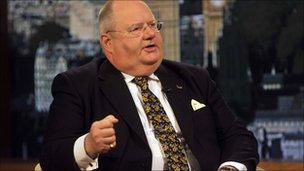Council credit cards 'used for luxury junkets'
- Published

Eric Pickles said councils would have to give details of their expenditure in future
Council staff have used taxpayer-funded credit cards to pay for top hotels and first-class flights, a newspaper says.
The Daily Telegraph said documents showed cards had been used to spend millions of pounds on hospitality,, external travel, iPads and even llamas.
Communities Secretary Eric Pickles told it: "Some councils have been enjoying the high life paid for by you and me."
But local government groups said proper use of credit cards was "entirely appropriate" and could cut red tape.
Local Government Association (LGA) chairman Baroness Margaret Eaton said: "The use of credit cards for legitimate purposes is entirely appropriate and transparent.
"It helps reduce red tape by removing the need to invoice businesses and helps the cash-flow of regular suppliers who receive more prompt payment.
"The £100m spent on council credit cards in the last three years represents less than 0.03% of the £350bn local authority budget over that time.
"Councils are the most transparent part of the public sector, publishing details of spending in excess of £500. We would like to see that matched in all central government departments which, with one exception, currently only publish spending in excess of £25,000."
Gucci bags
The Daily Telegraph said it had unearthed the information after making a number of requests under the Freedom of Information Act.
It comes as councils are trying to cut their spending by 28% over the next four years.
In addition to travel and hospitality, the paper said, some councils had bought luxury gifts, including Tiffany jewellery, Gucci bags and silk ties.
And it said Conservative-run Horsham Council in West Sussex had spent £1,150 on two llamas to graze on communal land.
The Telegraph said Cornwall Council's total credit card bill of £8.97m was the largest of any of the councils for which it had obtained details, and included £1,145,160 spent on hotels since 2008.
Cornwall Council officers had made trips to Goa in India, Bangkok in Thailand and Kyoto in Japan.
In a statement, Conservative-led Cornwall Council said it was one of the largest local authorities in the country and its overall budget for the same three year period was more than £3.5bn.
The council said the figures quoted in the Daily Telegraph were still being checked but at least £1.3m of the costs for overseas travel and hotels were "wrong", admitting it had not checked the data before it was released.
"One example of this is a figure of £114,142 for hotel costs in India for an educational exchange involving teachers from Cornish schools. This amount was actually in Indian rupees and would have been £1,645 in UK currency," the statement said.
Council leader Alec Robertson added: "Cornwall Council is committed to achieving the best possible value for money for council taxpayers in Cornwall.
"However, while we are committed to being open and transparent, this incident shows the importance of analysing raw data carefully and responsibly.
"We are disappointed that, having told the journalist that the information was inaccurate, they did not give us the time to provide them with the accurate information".
Cornwall's Liberal Democrat opposition leader Jeremy Rowe told the BBC: "At a time when Cornwall's lowest paid workers are having their pay frozen it is outrageous that the - often handsomely rewarded - people on the top floor at County Hall are lavishing vast sums on travel, hotels, home cinema systems and even £1,000 on 'pure silk ties'.
"It really is time the Tories, instead of merely posturing about keeping council spending under control, decided to get a grip on this astounding level of expenses on the taxpayers' credit card."
Communities Secretary Eric Pickles said: "Now that we are forcing councils to release details of their expenditure, the culture of wild overspends and excess which became the norm under Labour, will hopefully become a thing of the past."
- Published28 May 2011
- Published29 March 2011